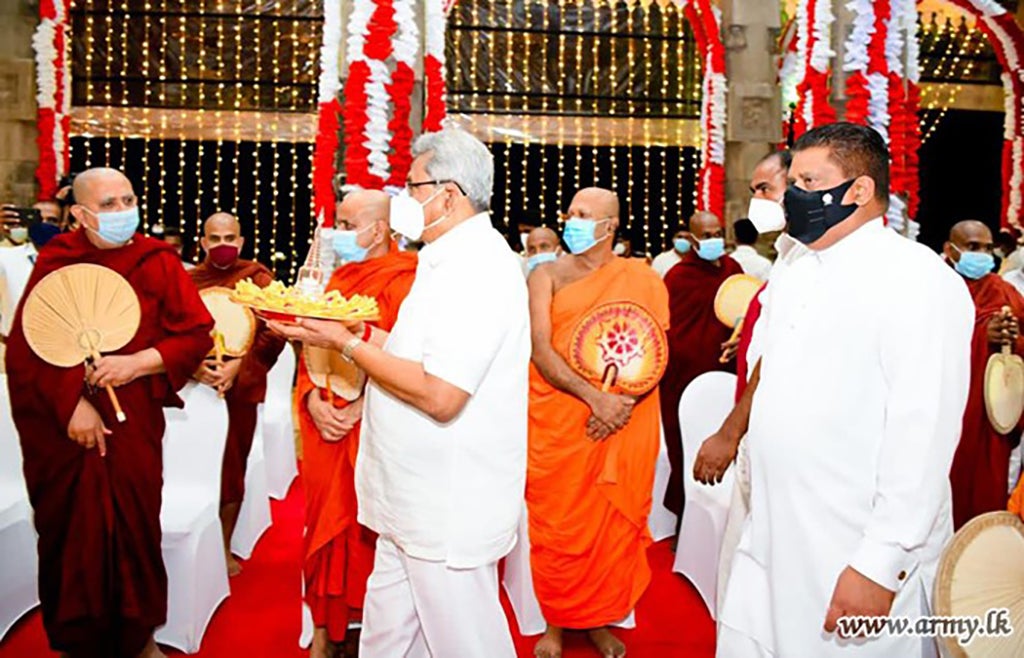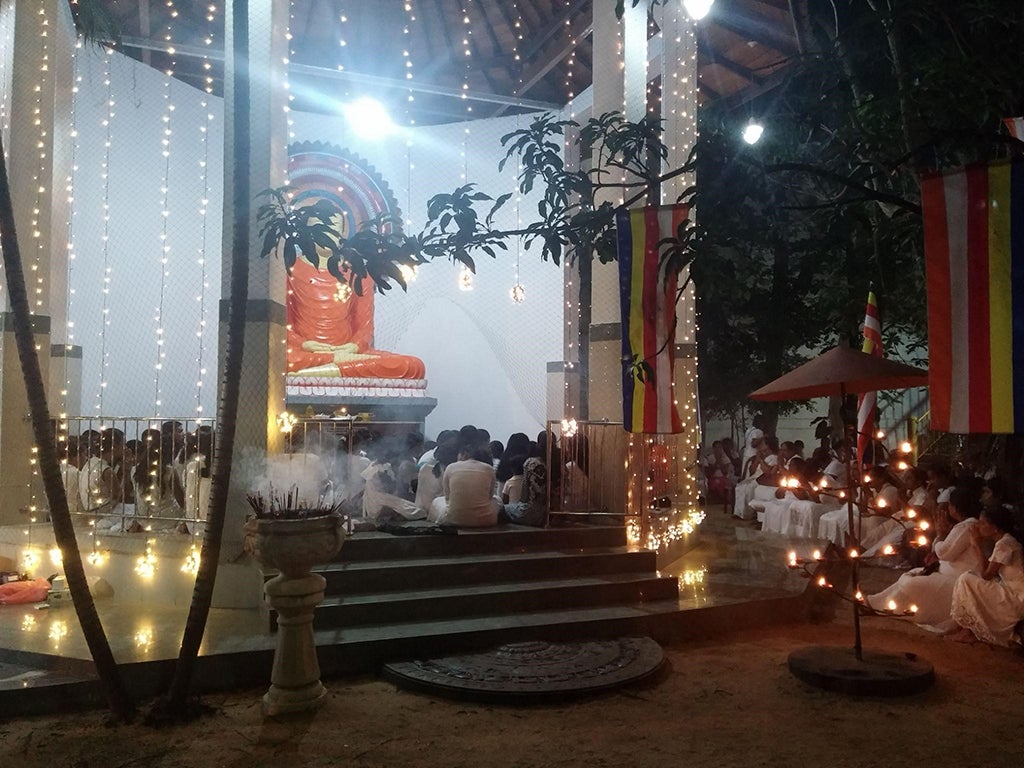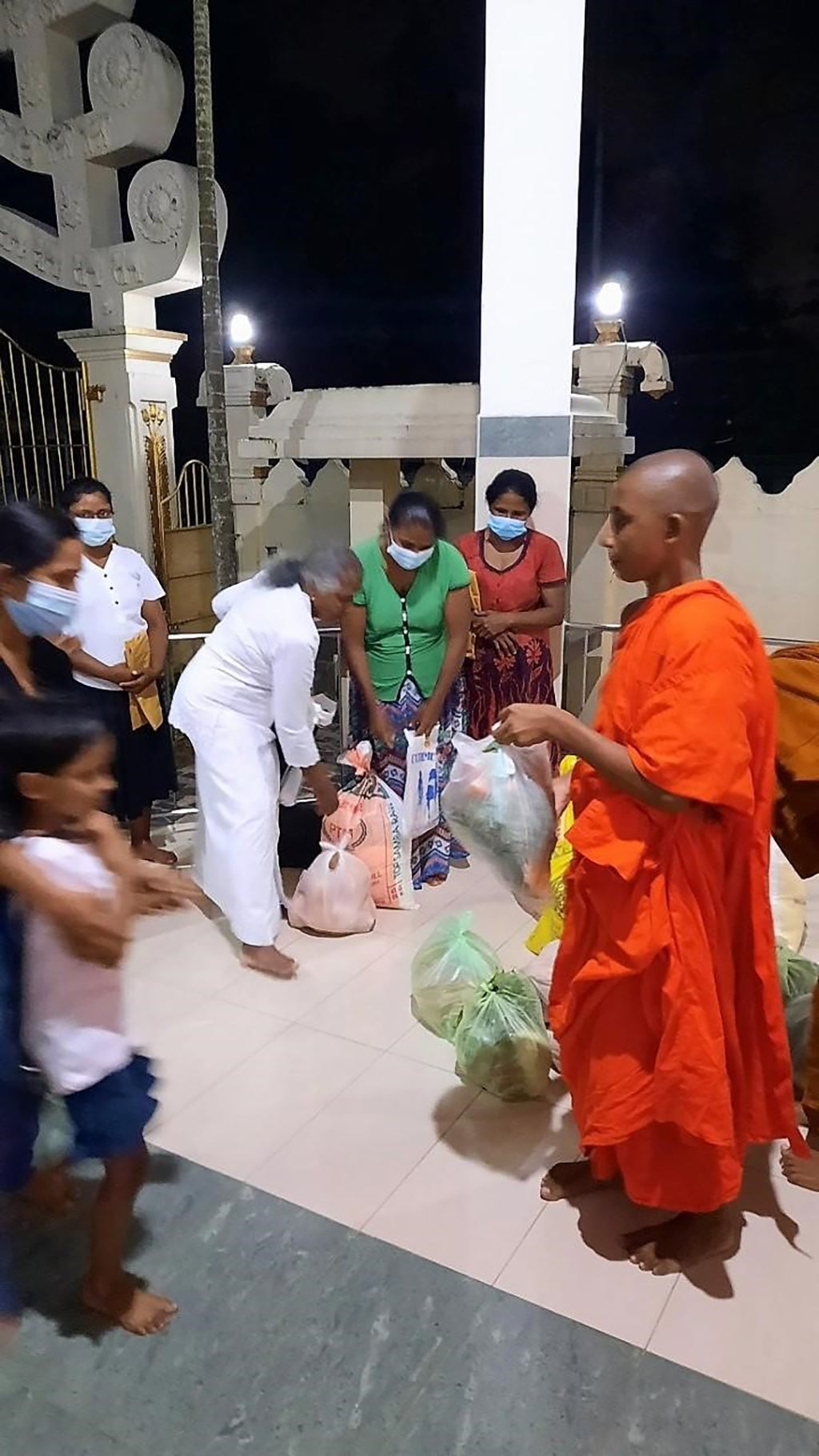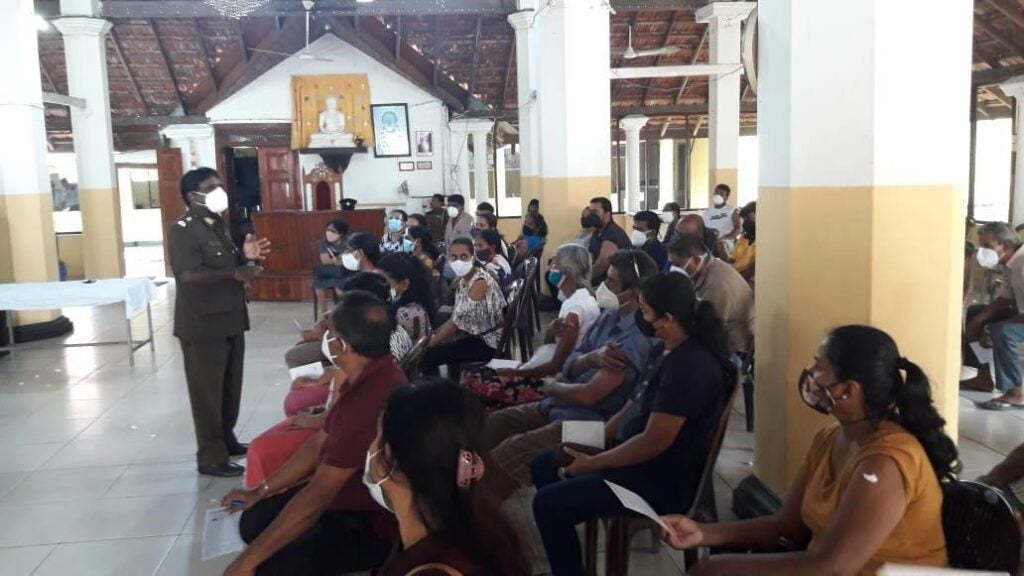Immunity through trust in urban Sri Lanka
contributed by Catherine West and Kanchana Dodan Godage, 3 January 2023

Image 1: President Gotabaya Rajapksa in a 21-day pirith chanting ceremony at Independence Square, Colombo (Sri Lankan Army website November 2020 https://www.army.lk/news/special-21-day-long-pirith-chanting-commences-independence-square-invoke-blessings-eradicate)
Both the Sri Narada temple in Narahenpita, Colombo, and the Sri Lankan government actively promoted techniques to avoid COVID-19 including vaccination, Ayurvedic medicine and Buddhist ritual – employed singly and plurally as pathways to immunity. Chief Incumbent Ven. Samitha Thero instructed devotees to stay away and follow all the government’s COVID-19 public health directives. He says that he followed the guidelines to the letter of the law, although this meant tempering his usual hand-on approach at a time when his community were suffering from illness, isolation, and deprivation. Devotees at Sri Narada temple reported that where government messaging and assistance was confusing and inconsistent, the temple provided them with relief, comfort, and practical support. We utilise a case study of the Sri Narada temple and draw on interviews with urban Buddhist devotees and Ven. Samitha Thero, contemporary media reports, and academic literature to explore local and national structures of trust.
Ritual
‘If a person is going to be hit by a bullet, I cannot say that he will escape from that by worshipping the Bo tree or making offerings. It is simply not valid. To help my devotees cope with the threat of the virus, I had to teach people about the limitations of Buddhist temple ritual.’
Ven. Samitha Thero (interview conducted 12th April 2022 via Zoom)
Before the pandemic Ven. Samitha Thero held large regular gatherings, but from 2020 he counselled devotees to avoid the temple. Ven. Samitha Thero utilised his exemption to the travel ban (afforded to religious leaders) to deliver in-person rituals. One devotee described the disruption to customary funeral rituals as particularly painful: ‘I often saw Samitha Thero going to the Jayaratne funeral parlour, near Borella cemetery. He didn’t want to disappoint the people who were stuck in quarantine, or overseas, who had no way to join in the last funeral rites of their loved ones’. Many long-standing donors to the temple live overseas. His care for their vulnerable and aged relatives in Colombo solidified trust and financial commitment to the temple and its works. He pragmatically re-engineered merit-making practices by redistributing money, food, and medicine (originally donated for his personal use) to those in need. He also maintained connections with local and international devotees via Zoom, chanting pirith online. The devotees described their relationship with the Sri Narada temple as being strengthened during this period of adversity. They viewed the affirmative action and online availability of Ven. Samitha Thero favourably.
Conversely, the government’s highly publicised ‘statist assertions of Buddhist power’, such as mass pirith chanting conducted by the military, the project to sprinkle pirith water across the island by helicopter, or the pouring of pirith water into rivers by government ministers, did not evoke such positive reactions or develop an enhanced relation of trust.

Image 2: Before the pandemic devotees attended rituals in large numbers at Sri Narada temple (photo by the author, Dr Catherine West, 2018)

Image 3: Devotees attend the Sri Narada temple in small numbers to coordinate and receive food relief, early 2021. Photo credit: Sri Narada Temple Facebook page

Image 4: A young monk helps volunteers to distribute packs of fresh food, early 2021. One devotee told us that over 7000 food packages were distributed. Photo credit: Sri Narada Temple Facebook page
Ayurveda
Although Ayurveda (particularly indigenous Sinhalese medicine) is common and well-regarded in Sri Lanka, its implementation was inconsistent in the uncertain times of the pandemic. Devotees in Narahenpita reported being overwhelmed by the promotion of miracle cures, some of which the government seemed to endorse. One Ayurvedic doctor, working adjacent to the temple, said that the lockdowns, misinformation, and inconsistent messaging made managing the health crisis very difficult: ‘People got their news from social media and from friends. I spent many hours convincing them to stay with tested treatments, not to think that crazy treatments would fix them’. Ven. Samitha Thero sought advice from Ayurvedic doctors and helped devotees to identify sound and unsound Ayurvedic practice, redistributing tonics that had been donated to the temple. In this way he gave his community certainty when it was in short supply, including information to help dispel myths around vaccination.
Vaccination

Figure 5: A public health inspector explains the vaccination guidelines to the general public at Maharagama, Colombo, in 2021. Photo credit: Daminda Wijesooriya
Early in 2020, the president shared his vision for ‘free vaccine up to the last citizen and nationwide vaccination at the fastest possible means’. Yet, stories emerged that urban frontline workers and the 60+ age group (the intended first recipients) were passed over in favour of high-status medicos and 30+ year old residents of the Rajapaksa’s rural electorate. Despite a strong extant health system and international support, trust in the vaccination program in Sri Lanka was undermined by political manoeuvring and inconsistent messaging. The government did little to suppress conspiracy theories and misinformation. Regardless, Ven. Samitha Thero still supported the national vaccination drive. He acted as a role model by being an early adopter of vaccination and counselled devotees to get over their fears. He and his devotees also prepared food for distribution by the army at a mass vaccination centre at Thurstan College.
Same pathways, different structures of trust
Sri Lanka’s response to the COVID-19 pandemic reveals a framework of political, religious, medical, and social relations. Because of inconsistent messaging and regulation from the government, and an extant culture of multiple and holistic ideologies of wellbeing, the community’s usually flexible and plural approaches to health were thrown into overdrive. This included an intricate balancing of desires for metaphysical protection and material immunity. Whereas both national and local level institutions utilised the tropes of Buddhist ritual, Ayurveda and vaccination, we found that the temple in our case study exemplified a local-level response that engendered trust and satisfied the needs of the community, whereas the government was criticised for their inconsistency and self-serving behaviour. While a single temple and a national government are not comparable entities in terms of scale, we note that success in the health crisis of 2020/2021 rested on integrity, something that institutions of any size can demonstrate. With the economic crisis of 2022 fresh in our minds, it is tempting to see the government’s failure to engender trust, so marked in comparison to our case study, as a harbinger of structural nonfeasance to come.
Disclaimer: The views and opinions expressed in this article are those of the authors and do not necessarily reflect the position of the blog editorial team or the Asia Research Institute.
South Asia | Southeast Asia | East Asia | Other Places | Hinduism | Buddhism | Islam | Christianity | Other Religions
Dr Catherine West is an Anthropologist who completed her PhD at Deakin University, Australia. She writes about the post-independence transformation of Colombo, Sri Lanka, in terms of the urban environment, social formation, and religion. You can find more of her work on her Academia profile.
Kanchana Dodan Godage is a Political Scientist currently teaching at the Open University of Sri Lanka, Nawala, Colombo. She is interested in the electoral process, levels of government, and exploring how ethnic diversities interact and influence different layers of policy making and implementation. She received a BA and an MA in Political Science from the University of Peradeniya, Sri Lanka. She also has an MA in Public Policy and Governance from the North South University, Bangladesh.

